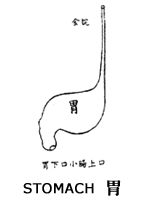Stomach Functions

Stomach rules receiving and ripening
The stomach, also known as "the sea of food and drinks", is responsible for "receiving" and "ripening" ingested food and drinks. When food and drinks are received by the stomach, they go through a fermentation process, so that the spleen can extract refined essence from them and the remaining part pass down to the small intestine. If the stomach fails in the actions, the most significant sign is a decreased appetite or anorexia.Stomach rules descending impure
Food and drinks are separated into two parts in the stomach. The pure part (refined essence) is extracted by the spleen for transformation into nutrient essence for the body. The impure part (undigested) is sent downwards to the small intestine for further separation and absorption. The descending action in the stomach should be in a continuous and smooth manner. If the descending action is interrupted, then stomach qi stagnation occurs, leading to food detention and symptoms such as bad breath, lower appetite, gastric and abdominal distention or pain, and hard stools. In some situations, the stomach qi becomes reversed, and thus symptoms like belch, nausea, vomiting and hiccups develop.Since the stomach is "the sea of food and drinks," what and how we eat can have a direct impact on its functions. More importantly, the descending action in the stomach is closely associated with liver’s flowing and spreading actions, and also complements with spleen’s ascending action. That means if the stomach is in disharmony, other organs will be affected too. It is a routine for physicians to pay attention to the stomach functioning, taking care of stomach qi is always an essential guideline in clinical practice.
For the stomach, the accomplishment of food receiving, ripening and descending actions should be operated in coordination with spleen’ transportation and transformation actions. A harmonious relationship between the stomach and spleen ensure the body has abundant nutrient essence, the source for the productions of fundamental substances. That is way TCM regards the spleen and stomach as “the root of acquired.” Pathologically, the two organs affect each other mutually, and so it is common to see both of their symptoms appear at the same time.
Being a yang organ and earth element, the stomach prefers a moist rather than dry environment, that means the stomach needs plenty of fluids in order to perform normally. When the stomach is over-functioning (a yang excess condition), dryness-heat syndrome can develop and present with dry mouth and thirst. On the other hand, the spleen belongs to a yin organ and earth element, which prefers a dry rather than moist environment. Spleen deficiency and excess dampness lead to symptoms like a decreased appetite, distention in upper abdomen, loose bowels and diarrhea (especially after greasy meals.) When selecting herbs for their remedies, stomach disharmony should use herbs with mild and moistening properties, while spleen disharmony should use herbs with warming and drying properties.
Click here to read more about the Stomach Meridian.


